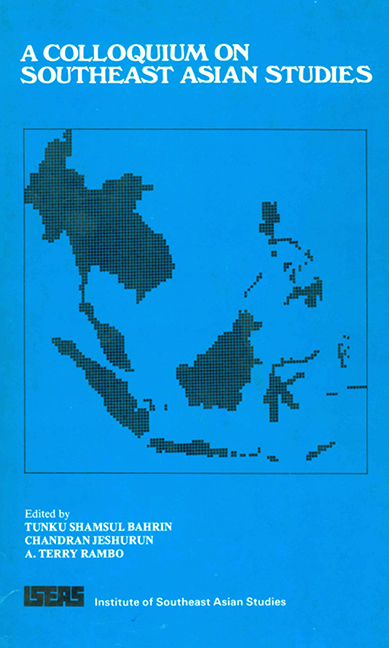Book contents
- Frontmatter
- Contents
- Foreword
- Preface
- Acknowledgements
- Introduction
- Contributors
- PART I TEACHING AND RESEARCH
- PART II ENVIRONMENT AND DEVELOPMENT
- 15 Environment and Development: The Place of Human Ecology in Southeast Asian Studies Programmes
- 16 Environment and Development in Southeast Asia: Trends, Themes and Issues
- 17 Development, Environmental Quality and the Quality of Life in Peninsular Malaysia
- 18 Environment Implications of the Mekong Development Programme
- 19 Development and Environment in Thailand
- 20 Review of Environmental Affairs in Indonesia
- 21 Research and Teaching on Human Ecology in Malaysia
- 22 Human Ecology in the Philippines: Developments in Research, Teaching and Applications
- 23 Environment Education Needs within A Southeast Asian Studies Programme
23 - Environment Education Needs within A Southeast Asian Studies Programme
from PART II - ENVIRONMENT AND DEVELOPMENT
Published online by Cambridge University Press: 21 October 2015
- Frontmatter
- Contents
- Foreword
- Preface
- Acknowledgements
- Introduction
- Contributors
- PART I TEACHING AND RESEARCH
- PART II ENVIRONMENT AND DEVELOPMENT
- 15 Environment and Development: The Place of Human Ecology in Southeast Asian Studies Programmes
- 16 Environment and Development in Southeast Asia: Trends, Themes and Issues
- 17 Development, Environmental Quality and the Quality of Life in Peninsular Malaysia
- 18 Environment Implications of the Mekong Development Programme
- 19 Development and Environment in Thailand
- 20 Review of Environmental Affairs in Indonesia
- 21 Research and Teaching on Human Ecology in Malaysia
- 22 Human Ecology in the Philippines: Developments in Research, Teaching and Applications
- 23 Environment Education Needs within A Southeast Asian Studies Programme
Summary
By way of an initial ideological stance, let us accept that the environmental concern which has erupted in the last decade in many parts of the world is both a positive and a permanent feature. It is positive and progressive in that it recognizes a deep-seated community urge to live in “productive harmony” with the natural systems by which we are surrounded, and that it compels a society to define its values and mobilize its social resources to realize them. It is permanent because it has, to all intents and purposes, become ingrained in the legal and administrative systems of many countries, as well as achieving international recognition through the holding of conferences, and in the accommodation of environmentalism within the structure of the United Nations itself.
Educational establishments and programmes must inevitably reflect this environmental concern. Whether or not educational establishments were the breeding grounds of the environmental movement, they cannot fail ultimately to incorporate a concern which has fast become part of the fabric of society. Universities in Western countries partly fostered the environmental movement of the 1960s and early 1970s, but very largely they followed it, or endeavoured to follow it. Environmentalism has been co-opted into the universities, showing up in the guise of research centres devoted to environmental issues, and a range of instructional programmes designed to introduce students to basic environmental concepts.
None the less, the basic propositions of environmentalism remain controversial. On the one hand we have those who prophesy universal ecological disaster lurking in the future unless mankind mends its ways. Among the best known of many advocates of this position we may cite two. Schumacher is concerned to show that many of the problems we presently discern arise from our devotion to the tenets of modern Western economics and business methods:
'…economic growth, which viewed from the point of view of economics, physics, chemistry and technology, has no discernible limit, must necessarily run into decisive bottlenecks when viewed from the point of view of the environmental sciences.[…]
- Type
- Chapter
- Information
- A Colloquium on Southeast Asian Studies , pp. 289 - 301Publisher: ISEAS–Yusof Ishak InstitutePrint publication year: 1981



